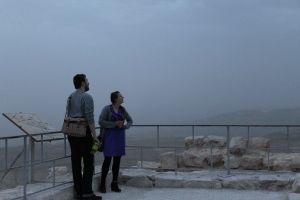This sermon was written for St Paul’s Episcopal Church in Seattle, Washington for Transfiguration Sunday. The gospel text was Mark 9:2-9.
There’s a game my husband and I play on our commute — maybe you play as well. The game is called: Is Rainier out? It’s initiated each time we near the West Seattle Bridge; either he or I will say, “Well? Is she out?” And we’ll examine the conditions, gaze into the sky, debate about the level of visibility. Whether we estimate correctly or not, when she’s out, we both feel like we won.
Perhaps this game is part of the reason it makes sense to me that the word “cloud” shares the same root as the word “clot,” as in a blood clot. They both come from clod: a clump of earth. Clouds are clumps of sky; clots are clumps of cells. It makes sense to me that these two words, cloud and clot, share their parent: both, material, stuck together; both capable of blockage and obstruction.
In this city, we know clouds intimately. We are familiar with their presence, familiar with their comings and goings, familiar with the way they seem to shift our landscape, shift what is visible and what is hidden.
My parents recently visited from Michigan, where they know clouds well but know very little of giant clods of earth. During their visit, as we drove about, they would comment on the landscape: the water, the green, the flower buds. The rain. But it’s winter; the view of the mountains, and of course the views of Mt Rainier as well, were continuously limited by clotty clouds, blocking our sight.
I tried to explain to my parents what they were missing. “There’s a glorious mountain right over there.” I showed them photos that didn’t do it justice. I pulled up a map. They said, Yes, sure, we know, we understand. But I knew they didn’t fully understand. They had the right concept — a hill but bigger, with snow on top — but they didn’t fully understand the right meaning. The clouds blocked their experience, and thus blocked their sight.
Peter, too, has the right concept but not a firm grasp on the right meaning behind it. The week before Peter sees Jesus transfigured on the mountaintop, Jesus asked him, “Who do you say I am?” Now, Jesus had triumphed over every foe: he had cured illnesses, debated critics, soothed nature, controlled spirits. And so Peter responds, “You are the Messiah.”
Peter was able to sincerely confess Jesus as the Messiah. But, like my parents relying on photos to understand the experience of a mountain, Peter was relying on insufficient images to understand who the Messiah is. He believed the Messiah to be the one who will triumph over every enemy, natural and spiritual. The one who ends all suffering and death. The Messiah has come, and Peter believes that as a result he will see an immediate end to despair, betrayal, grief, suffering, death.
In Mark’s account, the line of text after Peter’s confession that Jesus is the Messiah, Jesus starts speaking of what is to come: his suffering, his rejection by all respected authority figures. Jesus tells his disciples that he will be killed. Peter is appalled and rebukes Jesus — death is a sign of defeat, failure of mission. Certainly the Messiah will not, can not be defeated. God will not abandon the Messiah in this way.
It is in the midst of this confusion that Jesus takes Peter, along with James and John, and they hike to the top of a mountain. On the mountaintop, close to heaven, Jesus appears as a brilliant, dazzling figure, and alongside him are Moses, the bearer of the Law, and Elijah, the great prophet. There can be no doubt that Peter was right in naming Jesus the Messiah. This is certainly God’s Holy, Chosen One.
And I imagine that Peter must have thought: this is it, this is the arrival of the Kingdom of God, from this moment there will be no more misery, no despair, no betrayal, no grief, no suffering, and certainly no death. He offers to make dwellings. He wants the Holy Ones to settle, to set up camp, to move into the neighborhood and build a permanent home. He wants this moment of glory to be where they stay.
A cloud comes over them all, and the voice of God speaks: “this is my Son; listen to him.”
Jesus is silent. The words we are to listen to are the ones that have already been spoken, the ones that Peter did not want to hear — Jesus telling of his upcoming shame, suffering, and death.
To Peter, who had been hopeful, even certain, that the world was done with suffering and death, this cloud might have felt clot-like. This cloud might seem to obstruct the settling of Moses, Elijah, and Jesus. This cloud might be felt to obscure the immediate presence of the Kingdom of God by affirming that Jesus will, indeed, suffer and die.
I, too, was frustrated with clouds, during my parents visit. They had never been to Seattle before and I wanted them to have this image of dazzling beauty to take back home with them. I wanted the clouds to part and the sun to shine on the mountain and them to have the experience of seeing Rainier in all her glory.
But precisely because I was so focused on them seeing Rainier, I often missed the beautiful things we were able to see, the things my parents, in their enthusiasm, kept drawing my attention to: The moss growing thickly on banisters, turning a safety device into an enchanted thing. The incessant waves of water, their rhythm conveying something of the infinite. The way the clouds moved among the buildings. The clouds in all their beautiful grays. The very clouds I had been cursing have a beauty all their own.
Peter, too, wanted glory, and was slow to realize that there is beauty and glory in the grey, cloudy, clotty places; indeed, the voice of God, the blessing of God might be found precisely in the cloud that comes over us like a shadow.
In her poem Early February, Marilyn Chandler McEntyre writes:
Grace doesn’t always come as a rainbow.
Sometimes it hovers like a pewter sky
tucked in around the treetops,
bringing the landscape close to the eye.
Still, grace comes on a day like this
in odd disguises…
For the gifts of greyness let us give thanks:
cobblestones and flagstones and boulders of granite,
clapboard houses, dark-shuttered and lamplit in the afternoon,
snow on asphalt, pencil and charcoal,
the naked stretch of steel that protects us
at the bridge’s edge,
old movies from a kinder time,
the wolf and the owl — hungry and hidden —
the rabbit’s fur,
the hawk’s eye,
the dolphin’s back,
the cocoon where a caterpillar
quietly works out
its salvation.
Moses, Elijah, and Jesus, and Peter, John, and James — they do not get to stay on top of the mountain in the moment of dazzling and obvious glory. The Messiah will not avoid the hardships of human life. Jesus will not settle where it’s comfortable. Neither do we get to stay in shining moments for long, near heaven, on top of mountains.
The voice from the cloud comes to affirm what Jesus has told the disciples about his death, and to bless it. God comes in a cloud in a dramatic affirmation that Jesus will indeed continue to be God’s agent of redemption. Suffering is not the result of a withdrawal of heavenly favor. Death is not the result of a withdrawal of heavenly favor.
This God does not shy away from suffering. This God is not afraid of death. This God does not bypass the difficult things.
Jesus will not take the easy way, for he knows there is no shortcut to new life. And though we may look for shortcuts — the Seven Easy Steps to a Better, Fitter, Healthier, Happier, Richer, Kinder You — it should, perhaps, be unsurprising that we find ourselves with Jesus on the long, slow journey to salvation. So we go to the doctors appointments and treatments. We spend the hours in counseling. We show up again and again for the 12-step meetings. We apply for this job, and the next one, and the next. We grieve one day at a time. We come to prayer in rhythms, regular or irregular. These are our own slow, gray cocoons, in which we quietly work out our salvation.
God does not bypass the difficult things on the way to salvation, but joins us in them. The savior we know is named Emmanuel, the God who is with us. Just as God was with Jesus in his baptism, God is just as much with Jesus in his suffering and death. And God will be just as much with us through our times of suffering and, yes, death, as God was with us in our baptism.
And God is with us through our despair, and is loyal to us when we are betrayed. And God intimately knows our abandonment. And God weeps with us in grief. And God suffers alongside us.
For this God, in Christ, goes through death, and blesses it, on the way to new life.



